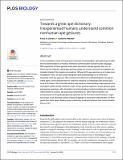Towards a great ape dictionary : inexperienced humans understand common nonhuman ape gestures
Abstract
In the comparative study of human and nonhuman communication, ape gesturing provided the first demonstrations of flexible, intentional communication outside human language. Rich repertoires of these gestures have been described in all ape species, bar one: us. Given that the majority of great ape gestural signals are shared, and their form appears biologically inherited, this creates a conundrum: Where did the ape gestures go in human communication? Here, we test human recognition and understanding of 10 of the most frequently used ape gestures. We crowdsourced data from 5,656 participants through an online game, which required them to select the meaning of chimpanzee and bonobo gestures in 20 videos. We show that humans may retain an understanding of ape gestural communication (either directly inherited or part of more general cognition), across gesture types and gesture meanings, with information on communicative context providing only a marginal improvement in success. By assessing comprehension, rather than production, we accessed part of the great ape gestural repertoire for the first time in adult humans. Cognitive access to an ancestral system of gesture appears to have been retained after our divergence from other apes, drawing deep evolutionary continuity between their communication and our own.
Citation
Graham , K E & Hobaiter , C 2023 , ' Towards a great ape dictionary : inexperienced humans understand common nonhuman ape gestures ' , PLoS Biology , vol. 21 , no. 1 , e3001939 . https://doi.org/10.1371/journal.pbio.3001939
Publication
PLoS Biology
Status
Peer reviewed
ISSN
1544-9173Type
Journal article
Description
Funding: This research received funding from the European Union’s 8th Framework 287 Programme, Horizon 2020, under grant agreement no 802719 to CH (https://ec.europa.eu/info/research-and-innovation/funding/funding-opportunities/funding-programmes-and-open-calls/horizon-2020_en). This work was supported by Gorilla Awards in Behavioural Science who provided the Gorilla.sc licensing fee and an unlimited participant award to KG (https://gorilla.sc/).Collections
Items in the St Andrews Research Repository are protected by copyright, with all rights reserved, unless otherwise indicated.

